外研版英语九年级上Module 3 Heroes Unit 2There were few doctors, so he had to work very hard on his own.课件+音视频
文档属性
| 名称 | 外研版英语九年级上Module 3 Heroes Unit 2There were few doctors, so he had to work very hard on his own.课件+音视频 |
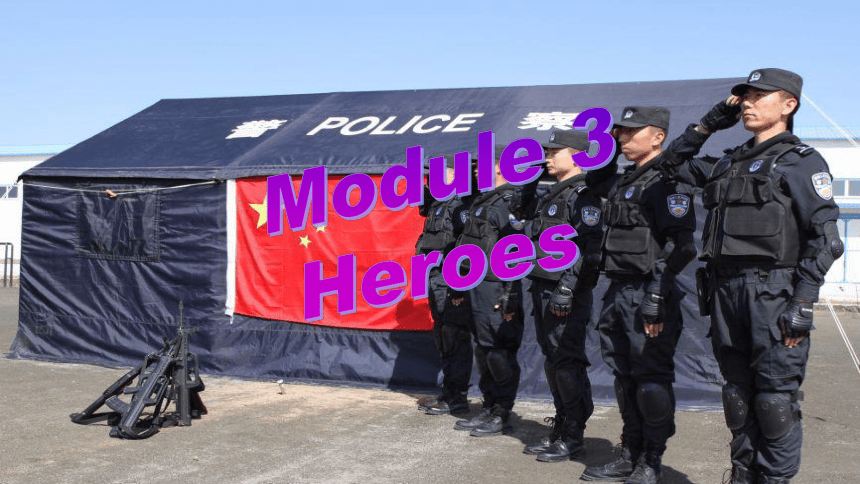
|
|
| 格式 | zip | ||
| 文件大小 | 16.6MB | ||
| 资源类型 | 教案 | ||
| 版本资源 | 外研版 | ||
| 科目 | 英语 | ||
| 更新时间 | 2019-11-26 10:32:06 | ||
图片预览

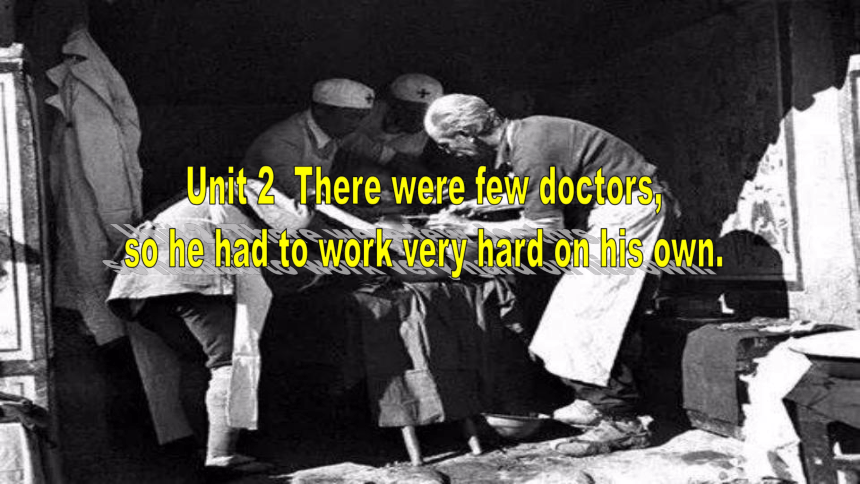
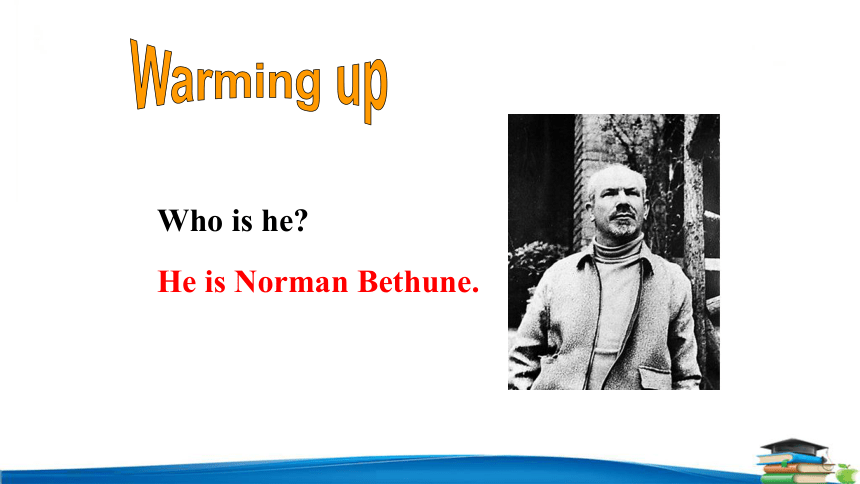
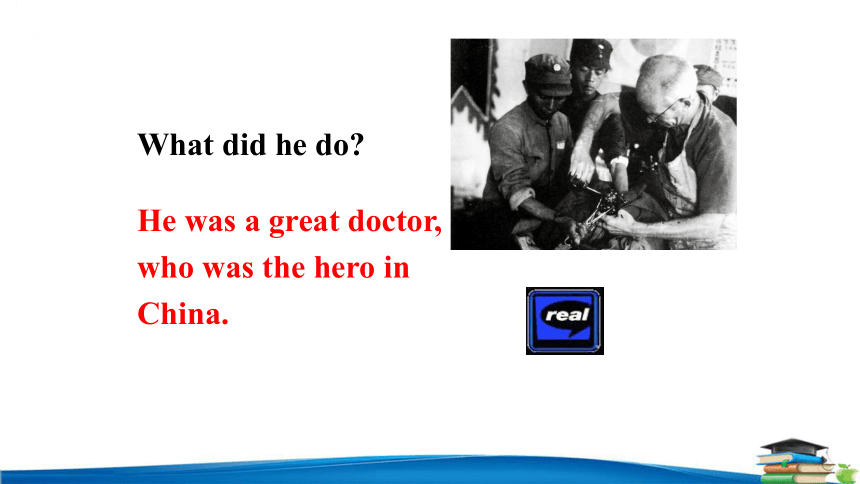
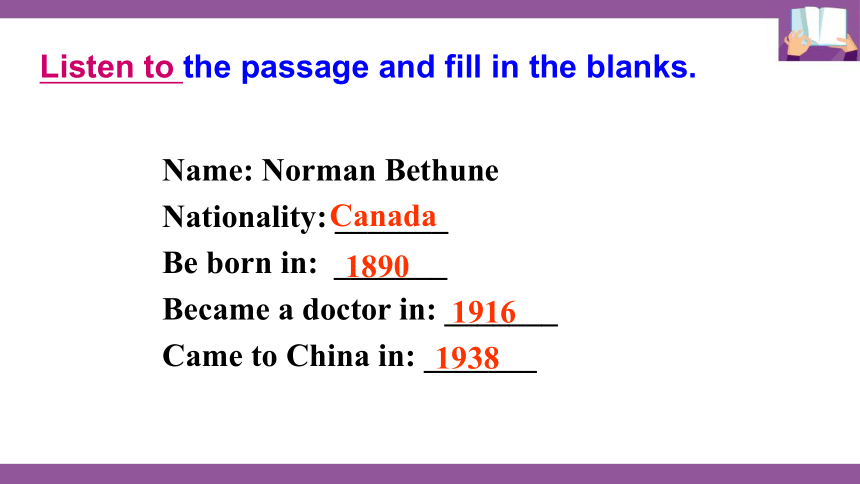
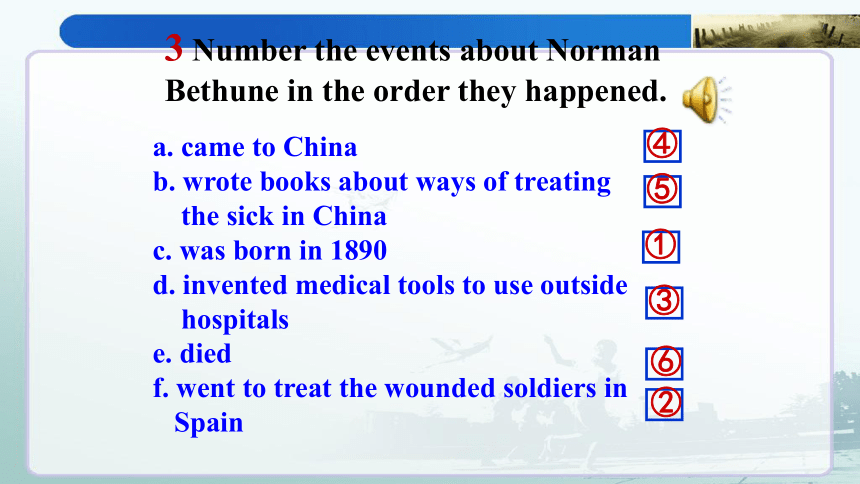
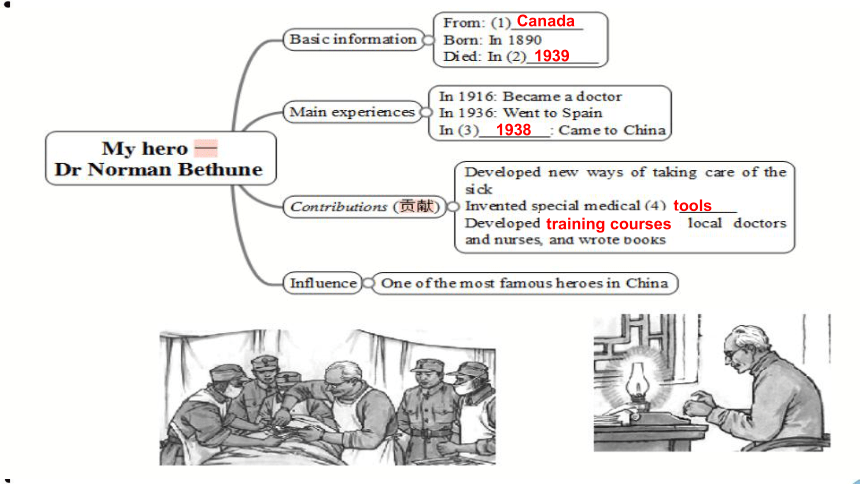
文档简介
(共15张PPT)
Module
3
Heroes
Unit
2
There
were
few
doctors,
so
he
had
to
work
very
hard
on
his
own.
Who
is
he
He
is
Norman
Bethune.
Warming
up
He was a great doctor,
who was the hero in
China.
What
did
he
do
Name:
Norman
Bethune
Nationality:
_______
Be
born
in:
_______
Became
a
doctor
in:
_______
Came
to
China
in:
_______
Canada
1890
1916
1938
Listen
to
the
passage
and
fill
in
the
blanks.
3
Number
the
events
about
Norman
Bethune
in
the
order
they
happened.
a.
came
to
China
b.
wrote
books
about
ways
of
treating
the
sick
in
China
c.
was
born
in
1890
d.
invented
medical
tools
to
use
outside
hospitals
e.
died
f.
went
to
treat
the
wounded
soldiers
in
Spain
①
②
③
④
⑤
⑥
Canada
1939
1938
tools
training
courses
Complete
the
passage
with
the
correct
form
of
the
words
in
the
box.
Canadian
continue
himself
invention
manage
sick
tool
war
wound
Norman
Bethune
was
(1)
_________,
but
he
is
one
of
the
most
famous
heroes
in
China.
During
the
(2)
______
in
Spain,
he
treated
the
wounded
soldiers
there.
He
invented
special
(3)
_____
to
use
outside
hospitals.
His
(4)
_________
saved
many
lives.
In
China,
he
(5)
_________
to
treat(6)
_____
and
wounded
soldiers.
Canadian
war
tools
inventions
continued
sick
Canadian
continue
himself
invention
manage
sick
tool
war
wound
He
often
worked
without
taking
a
rest
and
did
not
look
after
(7)
_______.
At
one
point,
he
(8)
________
to
save
over
one
hundred
lives
in
sixty-nine
hours.
During
an
operation,
he
cut
his
finger,
and
finally
died
of
his
(9)
_______.
He
is
still
remembered
in
both
China
and
Canada.
himself
wound
managed
Canadian
continue
himself
invention
manage
sick
tool
war
wound
My
hero—Dr
Norman
Bethune
By
Wang
Lingling
Norman
Bethune
is
one
of
the
most
famous
heroes
in
China.
He
was
a
Canadian
doctor.
He
came
to
China
to
help
the
Chinese
people
and
died
for
them.
由…创作
最著名的英雄之一
去帮助中国人
(to
do
sth表目的)
Norman
Bethune
was
born
in
1890.
He
became
a
doctor
in
1916
and
went
to
Spain
in
1936
to
treat
the
wounded
soldiers
during
the
war
there.
He
soon
realized
that
many
people
were
dying
because
they
did
not
get
to
hospital
quickly
enough.
Dr
Bethune
developed
new
ways
of
taking
care
of
the
sick.
He
invented
special
medical
tools
to
use
outside
hospitals
and
close
to
the
fighting
areas
so
that
doctors
could
treat
the
wounded
more
quickly.
His
inventions
saved
many
lives.
伤员
way
of
doing
sth做某事的方法
作战区
In
1938,
Dr
Bethune
came
to
China
and
helped
treat
the
wounded
during
the
Anti-Japanese
War.
At
that
time,
there
were
few
doctors,
so
he
had
to
work
very
hard
on
his
own.
His
experience
of
treating
people
in
Spain
was
useful
in
China.
He
developed
training
courses
for
local
doctors
and
nurses,
and
wrote
books
so
that
they
could
learn
about
how
he
treated
the
sick.
反日战争
few
几乎没有(否定+可数名词复数)
a
few一些(肯定+可数名词复数)
little
+几乎没有(否定+不可数名词)
a
little
+一些(肯定+不可数名词)
have
to
do
sth不得不做某事
Dr
Bethune
often
worked
very
hard
without
resting
or
taking
care
of
himself.
Once,
he
even
worked
for
sixty-
nine
hours
without
stopping
and
managed
to
save
over
a
hundred
lives.
One
day
in
1939,
he
cut
his
finger
during
an
operation,
but
he
continued
his
work
without
treating
it.
In
the
end,
he
died
of
his
wound.
without
+doing
无,没有
manage
to
do
sth设法做成某事
continue
to
do
sth
continue
doing
sth
继续做某事
die
for
为…而死
die
of
因…而死(内因)
die
from
因…而死(外因)
Dr
Bethune’s
work
for
the
Chinese
people
made
him
a
hero
in
China.
There
are
many
books
and
films
about
him,
and
he
is
still
remembered
in
both
China
and
Canada
today.
使他成为英雄
make
sb
+名词
使成为…
+do
sth
让某人做某事
+形容词
使某人怎么样
Module
3
Heroes
Unit
2
There
were
few
doctors,
so
he
had
to
work
very
hard
on
his
own.
Who
is
he
He
is
Norman
Bethune.
Warming
up
He was a great doctor,
who was the hero in
China.
What
did
he
do
Name:
Norman
Bethune
Nationality:
_______
Be
born
in:
_______
Became
a
doctor
in:
_______
Came
to
China
in:
_______
Canada
1890
1916
1938
Listen
to
the
passage
and
fill
in
the
blanks.
3
Number
the
events
about
Norman
Bethune
in
the
order
they
happened.
a.
came
to
China
b.
wrote
books
about
ways
of
treating
the
sick
in
China
c.
was
born
in
1890
d.
invented
medical
tools
to
use
outside
hospitals
e.
died
f.
went
to
treat
the
wounded
soldiers
in
Spain
①
②
③
④
⑤
⑥
Canada
1939
1938
tools
training
courses
Complete
the
passage
with
the
correct
form
of
the
words
in
the
box.
Canadian
continue
himself
invention
manage
sick
tool
war
wound
Norman
Bethune
was
(1)
_________,
but
he
is
one
of
the
most
famous
heroes
in
China.
During
the
(2)
______
in
Spain,
he
treated
the
wounded
soldiers
there.
He
invented
special
(3)
_____
to
use
outside
hospitals.
His
(4)
_________
saved
many
lives.
In
China,
he
(5)
_________
to
treat(6)
_____
and
wounded
soldiers.
Canadian
war
tools
inventions
continued
sick
Canadian
continue
himself
invention
manage
sick
tool
war
wound
He
often
worked
without
taking
a
rest
and
did
not
look
after
(7)
_______.
At
one
point,
he
(8)
________
to
save
over
one
hundred
lives
in
sixty-nine
hours.
During
an
operation,
he
cut
his
finger,
and
finally
died
of
his
(9)
_______.
He
is
still
remembered
in
both
China
and
Canada.
himself
wound
managed
Canadian
continue
himself
invention
manage
sick
tool
war
wound
My
hero—Dr
Norman
Bethune
By
Wang
Lingling
Norman
Bethune
is
one
of
the
most
famous
heroes
in
China.
He
was
a
Canadian
doctor.
He
came
to
China
to
help
the
Chinese
people
and
died
for
them.
由…创作
最著名的英雄之一
去帮助中国人
(to
do
sth表目的)
Norman
Bethune
was
born
in
1890.
He
became
a
doctor
in
1916
and
went
to
Spain
in
1936
to
treat
the
wounded
soldiers
during
the
war
there.
He
soon
realized
that
many
people
were
dying
because
they
did
not
get
to
hospital
quickly
enough.
Dr
Bethune
developed
new
ways
of
taking
care
of
the
sick.
He
invented
special
medical
tools
to
use
outside
hospitals
and
close
to
the
fighting
areas
so
that
doctors
could
treat
the
wounded
more
quickly.
His
inventions
saved
many
lives.
伤员
way
of
doing
sth做某事的方法
作战区
In
1938,
Dr
Bethune
came
to
China
and
helped
treat
the
wounded
during
the
Anti-Japanese
War.
At
that
time,
there
were
few
doctors,
so
he
had
to
work
very
hard
on
his
own.
His
experience
of
treating
people
in
Spain
was
useful
in
China.
He
developed
training
courses
for
local
doctors
and
nurses,
and
wrote
books
so
that
they
could
learn
about
how
he
treated
the
sick.
反日战争
few
几乎没有(否定+可数名词复数)
a
few一些(肯定+可数名词复数)
little
+几乎没有(否定+不可数名词)
a
little
+一些(肯定+不可数名词)
have
to
do
sth不得不做某事
Dr
Bethune
often
worked
very
hard
without
resting
or
taking
care
of
himself.
Once,
he
even
worked
for
sixty-
nine
hours
without
stopping
and
managed
to
save
over
a
hundred
lives.
One
day
in
1939,
he
cut
his
finger
during
an
operation,
but
he
continued
his
work
without
treating
it.
In
the
end,
he
died
of
his
wound.
without
+doing
无,没有
manage
to
do
sth设法做成某事
continue
to
do
sth
continue
doing
sth
继续做某事
die
for
为…而死
die
of
因…而死(内因)
die
from
因…而死(外因)
Dr
Bethune’s
work
for
the
Chinese
people
made
him
a
hero
in
China.
There
are
many
books
and
films
about
him,
and
he
is
still
remembered
in
both
China
and
Canada
today.
使他成为英雄
make
sb
+名词
使成为…
+do
sth
让某人做某事
+形容词
使某人怎么样
同课章节目录
- Module 1 Wonders of the world
- Unit 1 It's more than 2,000 years old.
- Unit 2 The Grand Canyon was not just big.
- Unit 3 Language in use
- Module 2 Public holidays
- Unit 1 My family always go somewhere interesting a
- Unit 2 We have celebrated the festival since the f
- Unit 3 Language in use
- Module 3 Heroes
- Unit 1 She trained hard,so she became a great play
- Unit 2There were few doctors, so he had to work ve
- Unit 3 Language in use
- Module 4 Home alone
- Unit 1 I can look after myself, although it won’t
- Unit 2 I became so bored with their orders that I
- Unit 3 Language in use
- Module 5 Museums
- Unit 1 Don't cross that rope!
- Unit 2 If you ever go to London, make sure you vis
- Unit 3 Language in use
- Module 6 Problems
- Unit 1 If I start after dinner, I'll finish it be
- Unit 2 If you tell him the truth now, you will sho
- Unit 3 Language in use
- Revision Module A
- Module 7 Great books
- Unit 1 We're still influenced by Confucius's idea
- Unit 2 It is still read and loved.
- Unit 3 Language in use
- Module 8 Sports life
- Unit 1 Daming wasn't chosen for the team last time
- Unit 2 He was invited to competitions around the w
- Unit 3 Language in use
- Module 9 Great inventions
- Unit 1 Will computers be used more than books in t
- Unit 2 Will books be replaced by the Internet?
- Unit 3 Language in use
- Module 10 Australia
- Unit 1 I have some photos that I took in Australia
- Unit 2 The game that they like most is Australian
- Unit 3 Language in use
- Module 11 Photos
- Unit 1 He's the boy who won the photo competition
- Unit 2 The photo which we liked best was taken by
- Unit 3 Language in use
- Module 12 Save our world
- Unit 1 If everyone starts to do something, the wor
- Unit 2 Repeat these three words daily: reduce, reu
- Unit 3 Language in use
- Revision Module B
